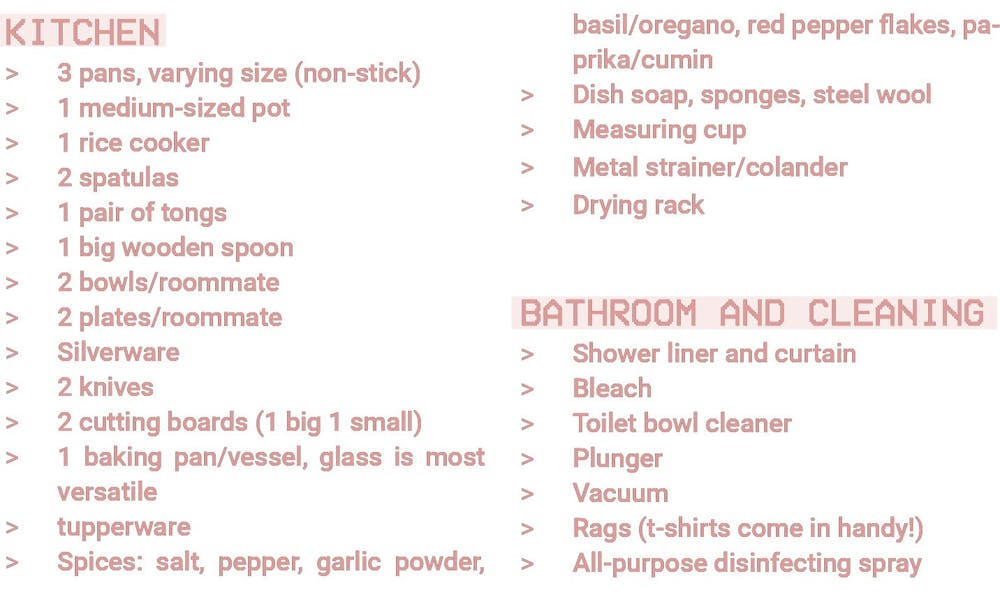Housing guide: What to expect when you’re expending — typical living costs beyond housing

If you’ve never lived on your own before, budgeting for living expenses on top of rent can seem overwhelming — especially if the closest you’ve come to budgeting at Rice is planning out how to spend your Tetra. The main costs you can never really escape are food and utilities.
Food
Grocery shopping, cooking and cleaning dishes take time and money. Plenty of off-campus students still opt for some kind of meal plan to save time, especially when they don’t have easy access to a car for grocery shopping.
With all of this being said, I live off campus with no meal plan or Tetra and it’s completely feasible if you have access to a car. You’re going to have many more repeated meals and fewer options each week than with dining on campus (especially if you don’t split groceries with a roommate), but learning to plan meals and cook is an essential life skill. I spend $40 to $50 a week at H-E-B and will have ingredients left over from week to week — it’s not uncommon that I decide to not shop on a given week because of groceries I haven’t yet used. I usually have frozen vegetables on hand because they’re cheap and usually just as nutritious as fresh ones, and then buy around four or five items of fresh produce a week. Frozen shrimp and frozen berries are good for the same reasons, as well as canned beans. Potatoes and sweet potatoes also take longer to go bad than other fresh produce, as well as alternative milks like oat or almond as opposed to cow milk. Also, eggs are cheap and you can eat real eggs now as opposed to servery eggs! Embrace eggs!
On top of that, I usually eat out once (and occasionally twice) on weekends — which I already did on Fridays and Saturdays while living on campus. Eating out almost always produces leftovers for another meal or part of another meal, so it isn’t that big of a splurge.
Almost any iteration of cooking for yourself and eating out will be cheaper than the $2,220 full meal plan, which would work out to around $148 a week.
Utilities
Utilities include electricity, gas, water and internet. Depending on your living situation, you may only pay for some of these on top of rent. Some apartments will have all utilities included in rent, but many don’t, and most houses won’t have any utilities included. Houses typically require a lot more energy to cool in the summer (and every other season) and heat in the winter (for the two weeks that it’s actually cold) than apartments. Some internet companies offer flat-rate fees for Wi-Fi, while others charge based on usage. My share of Wi-Fi (split with three roommates in a house) is usually up to $20 a month. Water, electricity and gas vary immensely based on the size of the living space, so be sure to ask whoever's lease you’re taking over — or landlord — how much utilities typically cost when you’re deciding on a place. I’ve spent around $100 a month, averaged across hot and cooler temperatures.
Reducing utility usage is better for your wallet and the environment. Tips for doing so may seem simple, but you probably haven’t thought much about them if you’ve been on campus. First of all, turn off your air conditioning or heating every time you leave home. If it’s too hot for no air conditioning, set the temperature much higher than what you’d keep it at when home and vice versa for heating in the cold. It’s not pleasant to walk into a warm home in the summer or a chilly one in the winter, but it probably won’t take that long for the temperature to get back to a comfortable one. Second, if you live in a unit with a dishwasher, it actually uses less water than washing all your dishes by hand. With that being said, never run a half-empty dishwasher. The “dishwasher saves water” rule doesn’t apply to running it when it’s mostly empty, so if you’re out of utensils — hand-wash a spoon! Finally, always turn off your lights when you don’t need them. It’s extremely obvious, but the only light switch you’re in charge of controlling while living on campus is probably in your own room. Plus, your parents won’t be around to (rightfully) complain when you leave the light on.
More from The Rice Thresher

New student center to ‘complete’ central quad
Breezeways, arches and outdoor seating will abound at the Moody Center Complex for Student Life set to break ground May 8. The 75,000-square-foot complex was designed by architecture firm Olson Kundig and has an expected completion date of fall 2027.

Best study snacks to fuel your finals
Finals are creeping up on us, and that means hunting season for the best study snacks on and off campus. Below are some that are sure to see you through the most enigmatic paper prompts and puzzling practice questions.

Head over handlebars: a brief history of Beer Bike accidents
In the first heat of the women’s race in this year’s Beer Bike, Melissa Geng said she was biking faster than she ever had, adrenaline pumping through her veins. All was going well, until she crashed into the fence of the alumni viewing area at the turn of her second lap.

Please note All comments are eligible for publication by The Rice Thresher.